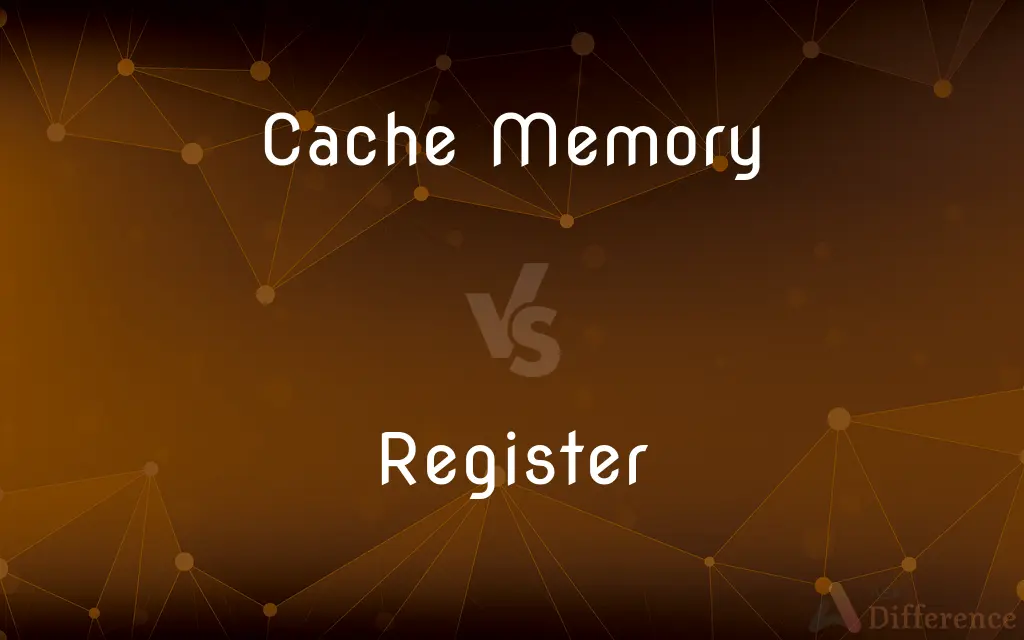Cache Memory vs. Register — What's the Difference?
By Tayyaba Rehman — Published on January 4, 2024
Cache memory is a small-sized, high-speed storage used to temporarily hold frequently accessed data, while a register is a tiny, ultra-fast storage inside the CPU for immediate data processing.

Difference Between Cache Memory and Register
Table of Contents
ADVERTISEMENT
Key Differences
Cache Memory and Registers are integral components of a computer's architecture but serve different purposes. Cache Memory is a small, fast memory layer that stores copies of frequently accessed data from the main memory (RAM), reducing data access time. Registers, on the other hand, are located within the CPU and are used to hold the data that the CPU is currently processing.
In terms of capacity, Cache Memory is larger than Registers but smaller than RAM. It typically ranges from a few megabytes to tens of megabytes. Registers, in contrast, are extremely small in size, usually just a few bytes, and are designed to hold only the most immediate data needed for CPU operations.
Cache Memory operates at speeds slower than Registers but faster than main memory. It plays a crucial role in bridging the speed gap between the ultra-fast CPU and slower main memory. Registers operate at the speed of the CPU, providing the fastest possible data access for immediate processing.
Cache Memory can be of various levels (L1, L2, L3), each level being slower and larger than the one before. Registers, located directly in the CPU, have no such levels and are designed for the quickest access.
The use of Cache Memory significantly improves overall system performance by minimizing the time-consuming operations of fetching data from main memory. Registers are essential for the CPU’s immediate computation tasks, holding instructions, storage addresses, and the small bits of data currently being used.
ADVERTISEMENT
Comparison Chart
Purpose
To temporarily store frequently accessed data
To hold data for immediate CPU processing
Location
Between CPU and main memory
Inside the CPU
Size
Larger (MBs)
Smaller (bytes)
Speed
Faster than RAM, slower than registers
Fastest, as it operates at CPU speed
Role in Performance
Improves data access speed from main memory
Essential for quick CPU operations
Compare with Definitions
Cache Memory
Cache memory improves overall system efficiency.
High cache memory size in a CPU contributes to better performance in gaming.
Register
They hold data for immediate processing by the CPU.
Registers temporarily hold data that the CPU needs to execute current operations.
Cache Memory
It serves as a buffer between RAM and the CPU.
Cache memory reduces the time it takes to access data from the main memory.
Register
Registers operate at the speed of the CPU.
Arithmetic calculations are performed using data stored in CPU registers.
Cache Memory
Cache Memory is a fast storage area for frequently used data.
The processor retrieves data from cache memory to speed up processing.
Register
They are the fastest type of memory in a computer.
Instruction registers store the current instruction being processed by the CPU.
Cache Memory
It has multiple levels like L1, L2, and L3 caches.
L1 cache, being closest to the CPU, is used for the most immediate data needs.
Register
(computing) A small unit of very fast memory that is directly accessible to the central processing unit, and is mostly used to store inputs, outputs, or intermediate results of computations.
Cache Memory
Cache Memory is smaller in size but offers quick data access.
Web browsers use cache memory to quickly load previously visited pages.
Register
Registers are small storage areas inside the CPU.
The CPU uses registers for storing the operands of the instructions being executed.
Register
Registers have very limited storage capacity.
The accumulator register is used to store intermediate arithmetic results.
Common Curiosities
Why are registers important in a computer?
They provide the fastest possible data access for the CPU to perform immediate operations.
How fast is cache memory compared to RAM?
Cache memory is significantly faster than RAM.
How is cache memory different from CPU registers?
Cache memory is larger and slower than CPU registers, acting as a buffer between RAM and the CPU.
How many types of registers are there in a CPU?
There are several types, including data, address, and general-purpose registers.
Can a computer function without cache memory?
Yes, but with reduced efficiency and speed.
What is cache memory in a computer?
It's a small, fast memory used to store frequently accessed data from RAM.
What are registers in a CPU?
Registers are tiny storage locations inside the CPU for immediate data processing.
What is the role of cache memory in multitasking?
It helps in quickly switching between tasks by storing necessary data close to the CPU.
Can cache memory size affect computer performance?
Yes, larger cache memory can significantly improve data access speed and overall performance.
Are registers visible to the operating system?
Registers are not directly visible or accessible to the operating system.
What data is stored in CPU registers?
Registers store data that the CPU needs immediately, such as operands and instructions.
Is it possible to upgrade cache memory?
Cache memory is built into the CPU and is not upgradable like RAM.
Is cache memory the same as RAM?
No, it's smaller and faster than RAM, serving as a temporary storage for frequently used data.
How does the size of registers affect CPU performance?
Larger registers can hold more data, which can slightly improve performance.
Do all CPUs have the same cache memory size?
No, cache memory size varies between different CPUs and models.
Share Your Discovery

Previous Comparison
and in Python vs. & in Python
Next Comparison
Multitasking in OS vs. Multithreading in OSAuthor Spotlight
Written by
Tayyaba RehmanTayyaba Rehman is a distinguished writer, currently serving as a primary contributor to askdifference.com. As a researcher in semantics and etymology, Tayyaba's passion for the complexity of languages and their distinctions has found a perfect home on the platform. Tayyaba delves into the intricacies of language, distinguishing between commonly confused words and phrases, thereby providing clarity for readers worldwide.
















































